Episode 484: Recap from the 2020 Young Farmers & Cooks Conference – The Regional Flower Economy: Flower Farming as a Viable and Profitable Facet of Agriculture
December 16th, 2020
Podcast: Play in new window | Download
Subscribe: Apple Podcasts | Podcast Index | RSS | More
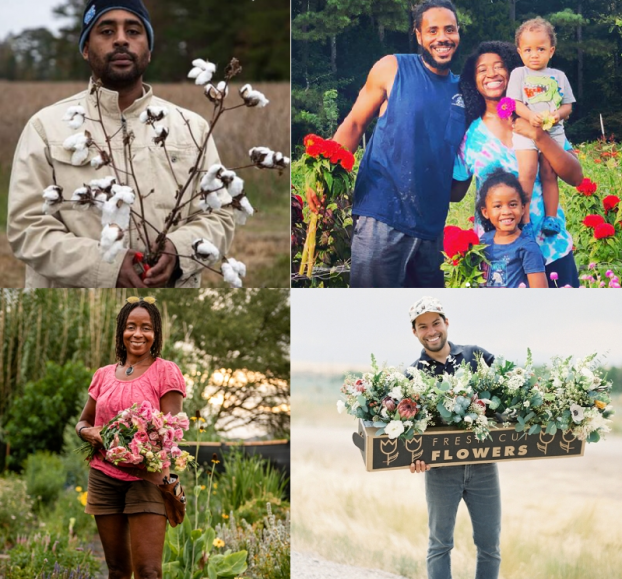
Two weeks ago, you heard from Shannon Algiere and Jessica Galen as we discussed the 2020 Young Farmers & Cooks Conference, held last week as a virtual event attracting more than one thousand attendees. Shannon and Jessica shared the story of Stone Barn Center for Food & Agriculture and gave us a preview of the conference. I want to thank Shannon, a Slow Flowers member, Stone Barns Center’s resident flower growing expert, farm liaison manager and co-director of the Arts & Ecology Lab for inviting me to gather together and moderate a flower-focused panel — and I’d like to share the audio of that presentation with you today episode.
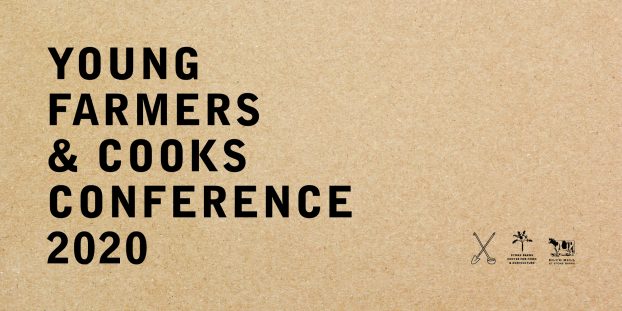
You’ll hear from four Slow Flowers members each of whom discussed her or his unique approach to agricultural entrepreneurship. They include Aishah Lurry, Patagonia Flower Farm, Julio Freitas, The Flower Hat, Taij Cotten and VC (Victoria) Edwards-Cotten, Perry-winkle Farm, and Julius Tillery, Black Cotton U.S.
As I said at the beginning of our panel, clearly, I am not a YOUNG FARMER, but through my passion for the Slow Flowers Movement I hope to shine a light on several of our members: flower farming pioneers you’ll meet today.
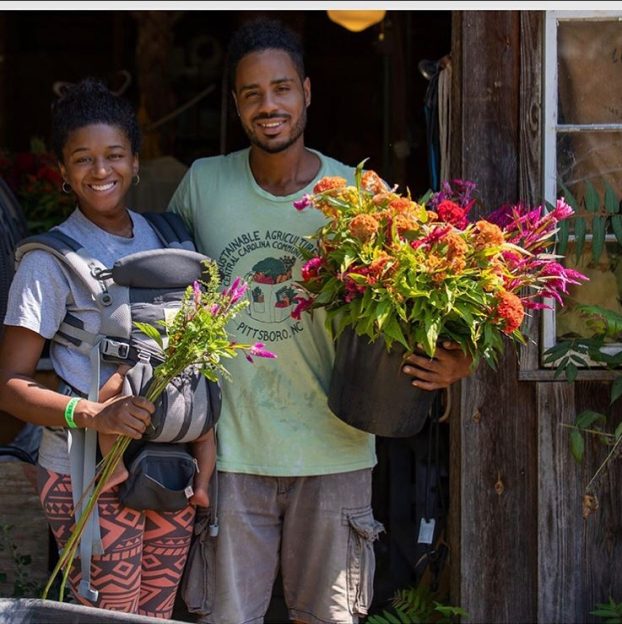
Taij & Victoria (VC) Cotten, of Perry-winkle Farm in Pittsboro, North Carolina
After responding to a Craigslist ad for Valentine’s Day in 2017 at Preston Flower Shop, Taij and Victoria were hooked on flowers. They quit their jobs and traveled North Carolina’s Piedmont farming region, talking with any farmer that had time for them. They quickly realized they wanted to farm.
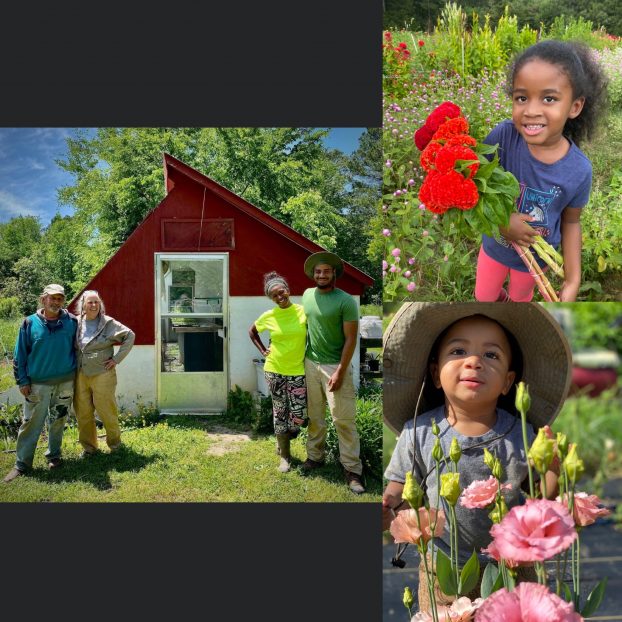
Now farming alongside their mentors and “farm-ily,” Michael Perry and Cathy Jones of Perry-winkle Farm, the young couple helps sustainably farm 4 acres in Northern Chatham County, North Carolina, specializing in seasonal vegetables, specialty cut flowers and pasture laying hens. Perry-winkle farm attends 3 regional farmers’ markets: Fearrington Village (a seasonal market) and 2 Carrboro Farmers markets (one seasonal and one year round). Taij and Victoria reside in Chatham County, NC with their two adorable, flower-loving children: Carleigh (6) and Titus (1)
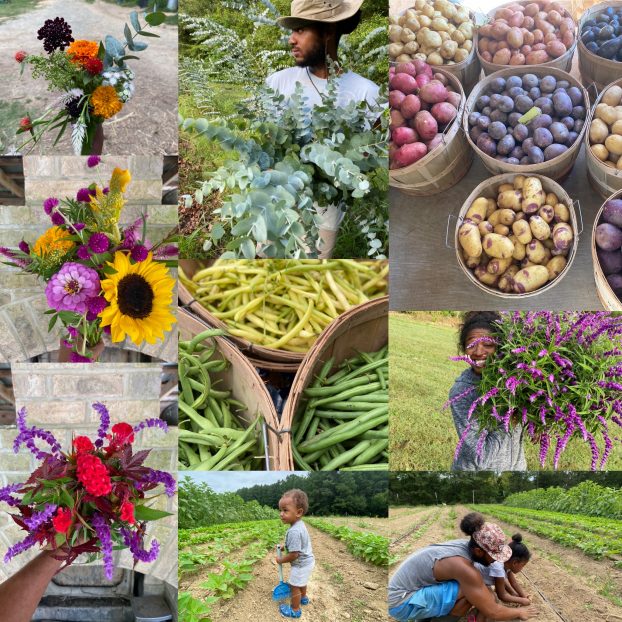
I first met Taij and Victoria at the 2018 Association of Specialty Cut Flower Growers annual conference in Raleigh, when destiny made sure we were seated together at the same banquet table. I’ve been following their adventures on social media ever since and am delighted to welcome them today.
Find and follow Perry-winkle Farm and Taij & Victoria
Perry-winkle Farm on Instagram
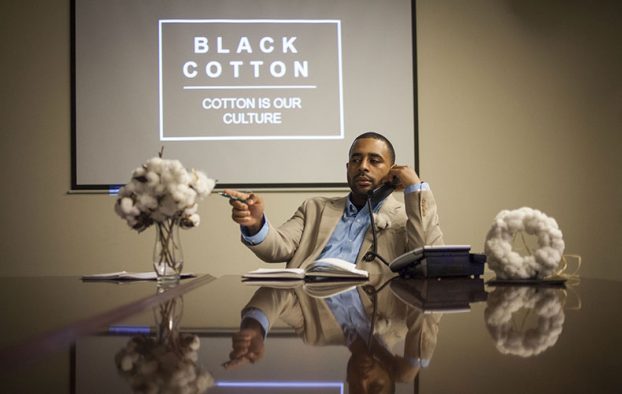
Julius Tillery, founder and CEO of Black Cotton U.S. Julius is the NC State Coordinator for the Black Family Land Trust. He is a 5th Generation life-long row crop commodities producer (cotton, soybeans, peanuts) from Northeastern, North Carolina. He has worked as an advocate and resource provider in the North Carolina agriculture and environmental sectors since 2009. Julius has also worked at Rural Advancement Foundation international and The Conservation Fund. He currently serves on the Southern Administrative Council for SARE (that’s the Sustainable Agriculture, Research and Education Council) and the North Carolina Forestry Advisory Council.
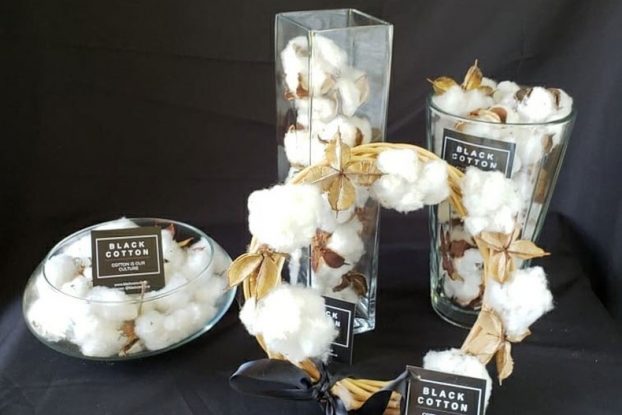
Julius is a rural economic development advocate and is also known for his entrepreneurial business role as Founder of BlackCotton U.S. You can find Julius anywhere between his farm working on producing crops, on another farmer’s farm helping consult with new enterprise development, or any meeting that is focused on improving the lives of farmers and farming communities across the USA. Julius is a graduate of the University of North Carolina at Chapel Hill with a degree in Economics and minor in Entrepreneurship in 2008.
Find and follow Black Cotton U.S.
Follow Black Cotton U.S. on Facebook
Follow Black Cotton U.S. on Instagram
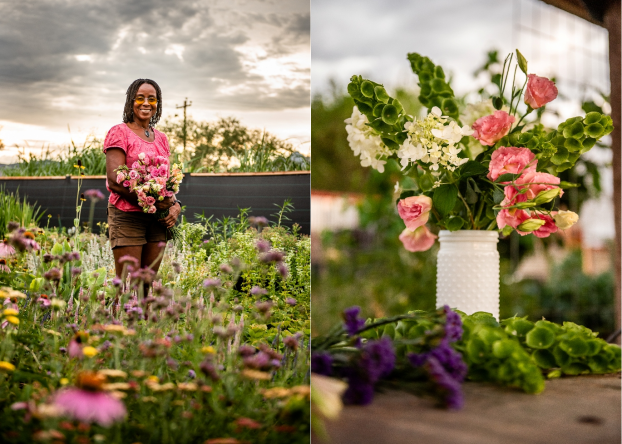
Aishah Lurry, founder and CEO of Patagonia Flower Farms based in Patagonia, Arizona. She is an artistic florist who combines her love for water-wise and organic farming techniques to produce affordable, healthy, and fresh-cut flowers.
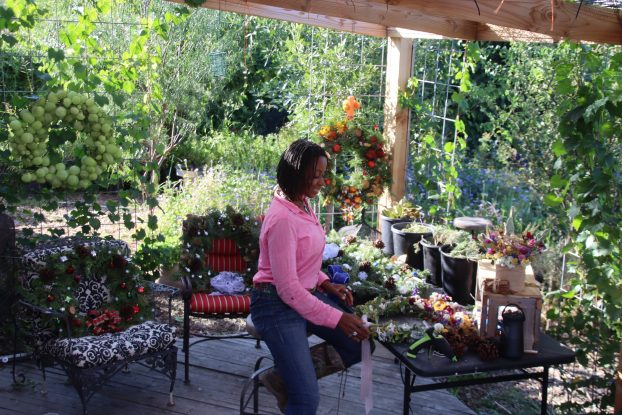
As a gardener who began her flower farming career in 2017, Aishah started her micro-farm on her home’s property after getting tired of driving 20miles out of town to buy overpriced and imported flowers that she didn’t like. By merging her expertise and knowledge of crop planning, propagation, harvesting, drying, and arranging, Aishah was able to turn her beloved hobby into a thriving business that celebrates eco-consciousness and the local economy.
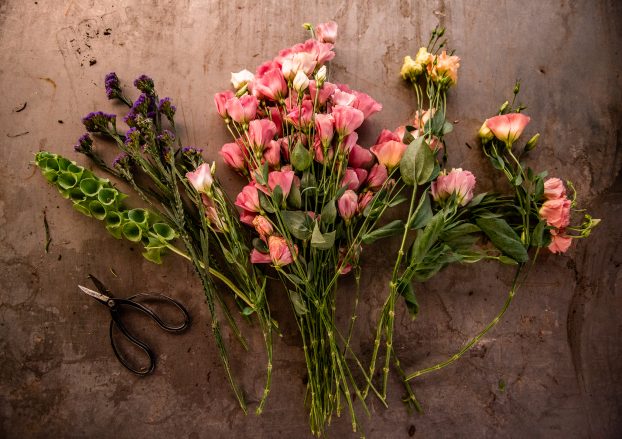
Aishah has taught several classes about sprouts, micro-greens, and propagation and today serves with Borderlands Restoration Network to further its native species and public education programs.
She considers her flowers a local, affordable, and well-deserved luxury. Each flower in Aishah’s hand-picked bouquets are lovingly grown to ensure health, vibrancy, and longevity of the ingredients.
Find and follow Patagonia Flower Farm
Patagonia Flower Farm on Facebook
Patagonia Flower Farm on Instagram
Listen to our past Slow Flowers Podcast episode with Aishah Lurry of Patagonia Flower Farm
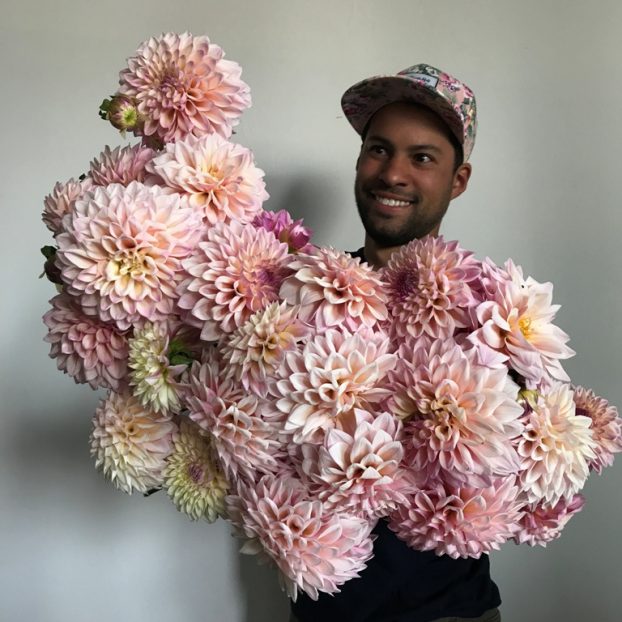
And finally Julio Freitas, owner of The Flower Hat. The Flower Hat is a floral design studio and flower farm nestled in the beautiful mountains of Gallatin Valley in Bozeman, Montana. The Studio is headed by internationally published designer Julio Freitas, whose design style embraces the seasons to create a loose, natural aesthetic that has graced hundreds of events, including many high profile and celebrity weddings.
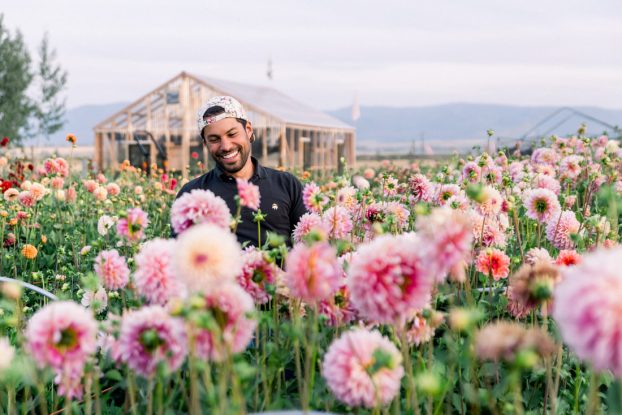
In an attempt to provide his clients with the best blooms, Julio decided to incorporate a Flower Farming component to the business operation. He started his growing operations on 1,800 sq ft and quickly leased ¼ acre plot for a few years, where he was able to grow and harvest thousands of flowers by using high intensity techniques. These locally grown flowers are truly the treasures that make his designs so spectacular.
Today, The Flower Hat is a thriving company that stays busy during the summer with weddings, selling flowers to florists and wholesalers. The company is also known for its coveted dahlia tubers that sell out in a matter of minutes that go on sale on February 1, 2020. Julio regularly hosts on-farm summer workshop intensive that go deep into the business model that makes The Flower Hat such a successful little company. The classes combine hand-on floral design experience, the business behind weddings and events and small scale flower farming.
Julio also finds room in his schedule to share everything he knows with others through floral design demonstrations as well as presentations about his high-intensity flower farming techniques on his Facebook Group The Flower Hat Exchange.
Find and follow The Flower Hat
Listen to our past Slow Flowers Podcast episode with Julio Freitas of The Flower Hat
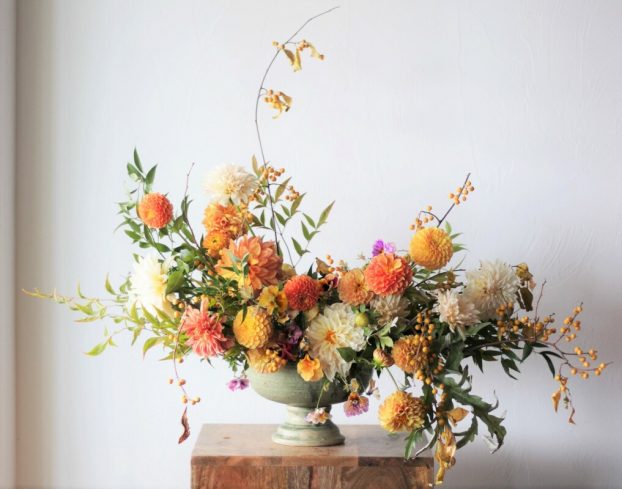
I posed three questions for discussion:
1. First, I asked each panelist to share an overview of their floral enterprise. Who they are, what do they produce/grow? where are they located and how long have they been farming.
2. Next, we talked about how flowers are part of their farm’s business model, how they sell and what market do they serve?
3. Finally, why flowers? Why grow flowers instead of food OR why integrate flowers in into a food-growing operation
Thanks so much for joining us today. What a great session. We did have some audio and technical challenges, so I promise to bring Julius Tillery from Black Cotton U.S. for a full episode in the near future, and I hope to also host a longer podcast conversation with Taij and Victoria.
Coming up, we have just two more episodes for 2020. Next week, on December 23rd, is our annual Slow Flowers Holiday Music Special Episode, featuring the talents of a Slow Flowers member whose life is influenced by both music and flowers. And on Wednesday, December 30th, the final episode of 2020, I’ll share our Year in Review with you. On the horizon, the first episode of 2021 will feature our 2021 Slow Flowers Floral Insights and Industry Forecast.
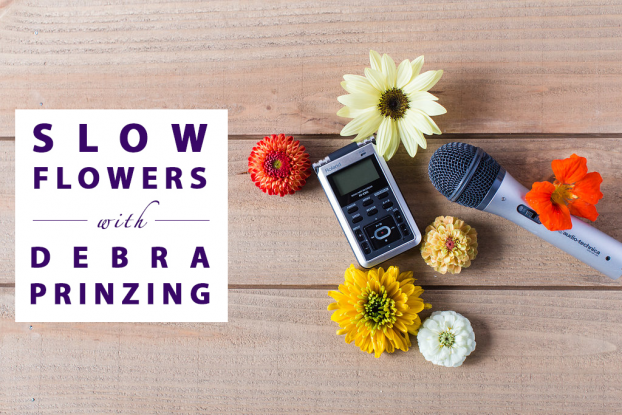
The Slow Flowers Podcast has been downloaded more than 669,000 times by listeners like you. Thank you for listening, commenting and sharing – it means so much.
Asking for your Support
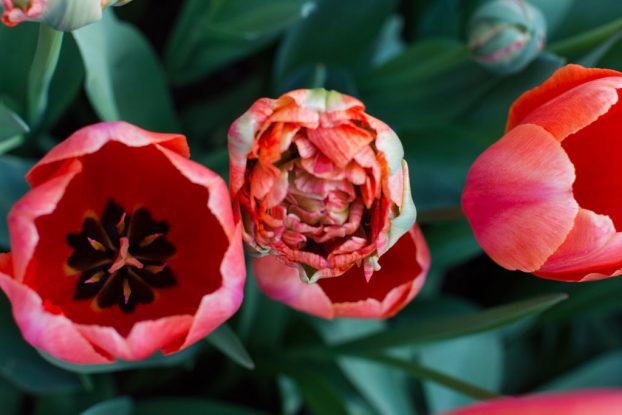
As our movement gains more supporters and more passionate participants who believe in the importance of our domestic cut flower industry, the momentum is contagious. I know you feel it, too. 2020 has been a challenging year for all of us and we have continued to deliver fresh, original content to you through the Slow Flowers Podcast, week in and week out — since 2013!
Not counting all of the time invested in developing the topics, guests and content, we spend more than $10k annually to bring you this award-winning internet radio program. Your financial support can ensure we continue into 2021. If every listener contributes just $2, those funds would add up quickly to cover our out-of-pocket costs to record, edit, host and promote the Slow Flowers Podcast. Would you consider making a year-end donation? I value your support and invite you to show your thanks to support Slow Flowers’ ongoing advocacy, education and outreach activities. You can find the donate button in the column to the right at debraprinzing.com
Thank you to our Sponsors!


This podcast is brought to you by Slowflowers.com, the free, nationwide online directory to florists, shops, and studios who design with local, seasonal and sustainable flowers and to the farms that grow those blooms. It’s the conscious choice for buying and sending flowers.
Seattle Wholesale Growers Market, a farmer-owned cooperative committed to providing the very best the Pacific Northwest has to offer in cut flowers, foliage and plants. The Growers Market’s mission is to foster a vibrant marketplace that sustains local flower farms and provides top-quality products and service to the local floral industry. Visit them at seattlewholesalegrowersmarket.com.
Association of Specialty Cut Flower Growers. Formed in 1988, ASCFG was created to educate, unite, and support commercial cut flower growers. It mission is to help growers produce high-quality floral material, and to foster and promote the local availability of that product. Learn more at ascfg.org.
The Gardener’s Workshop, which offers a full curriculum of online education for flower farmers and farmer-florists. Online education is more important this year than ever, and you’ll want to check out the course offerings at thegardenersworkshop.com.
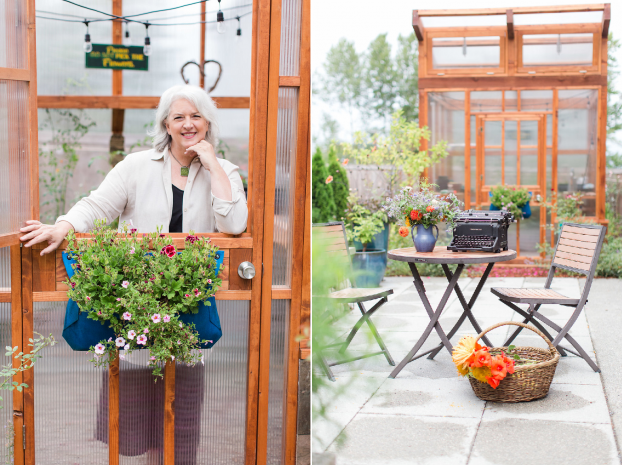
I’m Debra Prinzing, host and producer of the Slow Flowers Podcast. Next week, you’re invited to join me in putting more American grown flowers on the table, one vase at a time. And If you like what you hear, please consider logging onto iTunes and posting a listener review.
The content and opinions expressed here are either mine alone or those of my guests alone, independent of any podcast sponsor or other person, company or organization.
The Slow Flowers Podcast is engineered and edited by Andrew Brenlan. Learn more about his work at soundbodymovement.com.
Music Credits:
Open Flames; Turning on the Lights; Gaena
by Blue Dot Sessions
http://www.sessions.blue
Lovely by Tryad
http://tryad.bandcamp.com/album/instrumentals
http://creativecommons.org/licenses/by-sa/3.0/
In The Field
audionautix.com









March 10th, 2021 at 9:38 am
[…] for Sustainable Agriculture, which I moderated — and later shared as a Slow Flowers Podcast episode 484 on December 16th. They shared part of their story then, but we were pressed for time to include all the panelists, […]